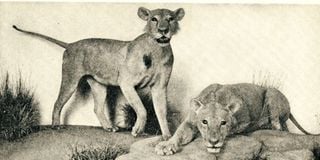Man eaters of Tsavo: Bring back the lions, Taita Taveta tells US Chicago museum

The man-eaters of Tsavo in a lifelike mount at the Field Museum of Natural History in Chicago, USA. They were sold to the museum for US$ 5,000 in 1924.
What you need to know:
- The lions are considered a national heritage and a potential source of revenue for the county.
- The Kenyan government has been demanding the return of the Man-Eaters of Tsavo.
Residents and leaders of Taita Taveta County have called for the repatriation of the remains of Man-Eaters of Tsavo, a pair of notorious lions that killed dozens of railway workers in 1898, from the United States to Kenya.
The lions, which are currently on display at the Field Museum of Natural History in Chicago, are considered a national heritage and a potential source of revenue for the county, which is facing the challenges of human-wildlife conflicts due to its proximity to the Tsavo National Park.
The man-eaters of Tsavo were hunted down and killed by Lieutenant Colonel John Henry Patterson, a British engineer who was supervising the construction of a railway bridge over the Tsavo River in Kenya, then known as British East Africa. Patterson wrote a book about his experience, titled The Man-Eaters of Tsavo, which was published in 1907.
The book was later adapted into several films, the most recent being The Ghost and the Darkness (1996), starring Val Kilmer and Michael Douglas.
Patterson sold the lion skins and skulls to the Field Museum in 1924 for $5,000. The museum reconstructed the lions using taxidermy and put them on display in 1928. They have since become one of the most popular exhibits in the museum, attracting millions of visitors every year.
The Kenyan government has been demanding the return of the Man-Eaters of Tsavo and now the residents and leaders of Taita Taveta County, where the Tsavo National Park is located, have joined in the calls to have the two big cats repatriated.
Speaking in Mwatate, MCA Peter Shambi said the lions belong to Kenya and should be displayed in a local museum or a wildlife sanctuary to earn revenue for the government and the residents who are reeling in poverty.
"The government, both at the national and county level, is facing the challenge of scarce resources yet the remains of our lions are earning another government revenues," he said.
Mr Shambi said the government should ensure that it earns revenue from the remains of the two lions for residents in the county to benefit.
"They are either brought back or we get a piece of our cake. Some tourists come to Tsavo to see where the incident happened many years ago. Would it be better if we had that museum here?" he said.
The MCA was speaking during a meeting with the National Assembly’s Tourism and Wildlife Committee which had visited the county to listen to the grievances of residents in wildlife conflict-prone areas.
The acting chairperson of the committee, Alfred Mutai, said the assembly is working on a law that will see that the government benefits in terms of revenue generated from the two lions.
"A law is in the offing in Parliament to see that we get back the remains of our lions. That is on course," he said.
On the other hand, county residents who continue experiencing cases of human-wildlife conflict, complained that they get no benefit from the wildlife.
The residents of Alia, Landi, Kiteghe and Bungule, who were visited by the committee, expressed their frustration over the persistent wildlife menace that has left them poorer and hungrier.
The county, which borders the Tsavo East and West National Parks, has been a hotspot for wildlife invasions, especially by rogue elephants and stray lions, that destroy crops and kill livestock.
They also blamed the Kenya Wildlife Service (KWS) for being slow and inadequate in responding to invasions.
“They are not helping at all, elephants are still terrorising us. They destroyed all my crops yet I will not be compensated anytime soon,” said Damaris Mwachofi, a resident of Landi.
The residents also lamented that they do not benefit from the wildlife resources that are a source of income for the country.
“We are suffering because of these animals. They eat our crops, kill our animals and attack us. We don’t get any benefit from them,” said Mary Mwakio, a resident of Kasigau.
The residents also called for the erection of electric fences and the provision of alternative livelihoods to reduce their dependence on farming and pastoralism.
The residents also called for more measures to prevent and mitigate human-wildlife conflicts, such as erecting electric fences, deploying problem animal control units, and involving local communities in wildlife conservation.
Voi MP Abdi Chome and his Mwatate counterpart Peter Shake want wildlife compensation to be fast-tracked.
The MPs have called for the speedy compensation for wildlife victims, saying many residents have suffered losses, injuries and deaths due to wildlife attacks, but have not received adequate and timely compensation.
MP Chome also expressed concern over the rising cases of human-wildlife conflicts in the area.
"This issue must be addressed. The grievances of the affected communities and enhance coexistence between people and wildlife," he said.
They urged the government to allocate more funds for the compensation scheme and to clear the backlog of pending claims.
In July, the government released Sh51 million for victims or their dependants as compensation covering the period 2014-2019.
But Mr Shake termed the funds as a drop in the ocean.
“We need to find a balance between conservation and development. We need to protect our wildlife and our environment, but we also need to benefit from them. We need to involve the local communities in the management and decision-making of wildlife resources. We also need to compensate the victims of wildlife damage and support the alternative livelihoods of the people living near the park,” MP Shake said.





